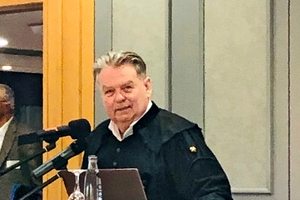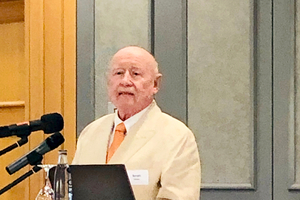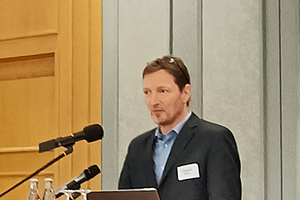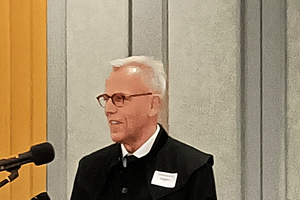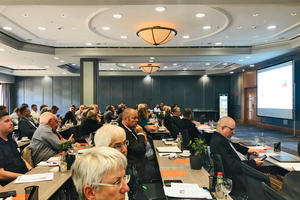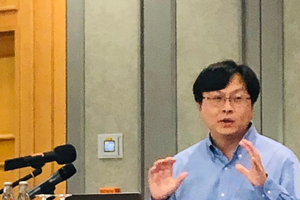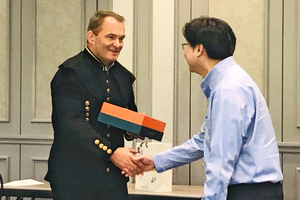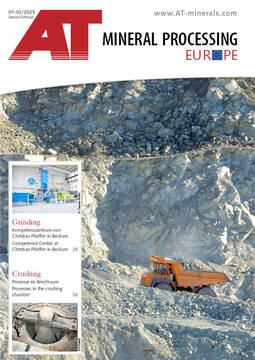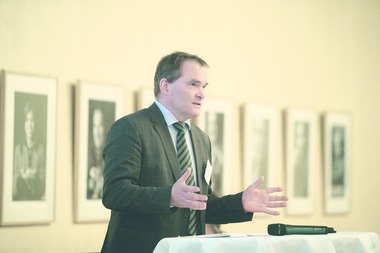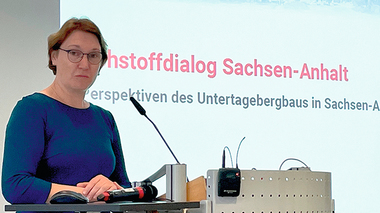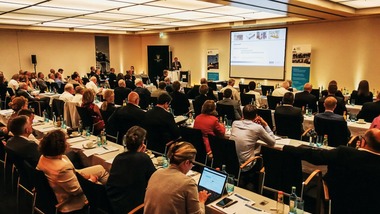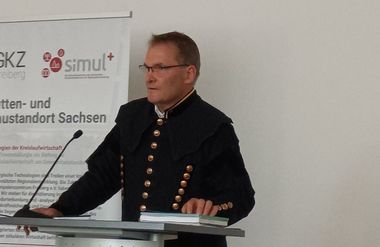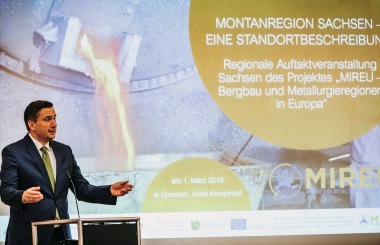The Saxon Raw Materials Day 2024
In his opening speech, Dr.-Ing. Hendrik Gaitzsch, Chairman of the GKZ Board of Directors, gave a special welcome to Minister of State Martin Dulig, Saxon Ministry of Economics, Labor and Transport, who had assumed patronage of the event and gave the plenary address. Dr. Gaitzsch thanked the Ministry for its financial support and emphasized its importance as an interface between politics and business and thus as a point of contact for the industry. The chairman of the CDU parliamentary group, Christian Hartmann, was greeted with approval and at the same time regretted that no other representatives from politics took the opportunity to exchange ideas. This year’s partner country for the event was Taiwan, a country with a large volume of primary and secondary raw materials and high recycling standards. In conclusion, Dr.-Ing. Hendrik Gaitzsch referred to the numerous players in the field of raw materials management, such as industry, science, academia, chambers, associations and clusters from the extracting and processing industries. “This diversity of interests shows that the raw materials industry is a central element of our economy,” he concluded his remarks and thanked Dr. Wolfgang Reimer, GKZ, in particular for his tireless commitment to this conference with international participation.
Plenary lecture
Moderated by Dr. Wolfgang Reimer, Minister of State Martin Dulig spoke on the topic of “The EU Critical Raw Material Act (CRMA) – an opportunity for the Saxon raw materials industry”. He described the “content-rich” 18th Saxon Raw Materials Day as a forum for exchange and emphasized that thanks to the GKZ, Saxony was heard in Brussels during the development of the CRMA. The implementation of this EU regulation, which came into force on 23 May 2023, represents an opportunity for Saxony, although many conditions have deteriorated in the meantime as many links have broken down. The CRMA is intended to make Europe more competitive. The aim is to create a well-founded awareness of raw materials and to speed up approval procedures. Saxony can make its contribution, for example, through the deposits in the Ore Mountains. “The largely negative attitude towards mining must be eliminated, dependencies must be reduced and sovereignty must be achieved. This is the only way to maintain prosperity,” said the Minister. Other key statements concerned financing, the necessary trade-offs between raw materials, the energy industry and nature conservation as well as the implementation of the measures derived from the Saxon raw materials strategy, which require a financial volume of around € 220 million. Corresponding funding measures are currently being developed. Minister Dulig concluded his presentation with statements on the elimination of the shortage of skilled workers, the successful recruitment of skilled workers and the good opportunities for training in mining-related areas with different levels of training in Freiberg, as well as the fact that the GKZ is the only competence cluster for the implementation of the EU-CRMA.
This was followed by 9 specialist presentations on various sub-topics in three blocks.
Perspectives of foreign investors on the European framework conditions in the raw materials sector
In an overview presentation, Dietrich Wanke, CEO of European Lithium Ltd. West-Leederville/Australia, spoke about “The Koralpe lithium mining project near Wolfsberg, Carinthia/Austria, and the framework conditions in terms of energy and financing in the EU”. European Lithium Ltd is a global company with 44 exploration licenses and two mining licenses in the Koralpe. He explained the project schedule (pre-feasibility study 2018, feasibility study 2020/23, public presentation of the study). The deposit comprises 15 veins, 12.9 million tons of ore with a grade of 1.0 % Li2O have been explored, meaning that a quantity of 800 000 t/a can be expected to be mined in surface and underground mining. An initial trial mining was successful, so that the complete value chain from raw ore to the production of a standardized concentrate with separation of by-products to the production of battery-ready Li products (Li2CO3; LiOH), including the economic efficiency of the process, could be mapped in a pilot plant. The speaker explained the process including the very complex hydrometallurgy. By integrating an underground backfill plant, nature conservation and environmental protection are also taken into account, as no stockpiles are created above ground. Statements on the further development of the project and the implementation strategy (start of construction of the mine and the spodumene concentrator in 2025, production of the Li2O concentrate in 2027, as well as Li2CO3 and LiOH in 2028/29) rounded off the interesting presentation.
President Volker Spieth, Gobal Metal LLC, Arizona/USA, dealt with “Securing raw materials ‘Made in USA’ – insight into the strategies and subsidies in the course of the Inflation Reduction Act and a comparison with the European strategy”. Based on the growth of the world population, the rapidly increasing demand for raw materials, the unequal distribution of raw materials and the different ways of realizing mining projects and thus securing raw materials in their own countries, he outlined the major differences between the USA and Germany/Europe. Despite the EU regulation on critical raw materials adopted in March 2024, which is intended to promote the supply of our own raw materials, we are a long way from making significant progress in securing raw materials. Wishful thinking is not the order of the day, reality must be taken into account. And America is doing this with a pragmatic realpolitik, for example with the “Defense Production Act” for mineral raw materials. A rethink has begun – away from globalization and towards safeguarding national supply interests, a recipe for success in which politics and business act together. (Example: new manganese deposit in Nevada, 2-year approval phase, state financial support, can go as far as total financing depending on the urgency of the project).
The presentation by CEO Marko Uhlig, Zinnwald Lithium GmbH, Altenberg, and CEO Dr. Stefan Scherer, AMG Lithium GmbH, Frankfurt about “Economic policy location conditions for the valorization of domestic lithium deposits” focused on extended value chains. It is the second largest Li project in hard rock in the EU and the third largest in Europe (resources: 2.7 million tons of Li2CO3): it has a production potential of 35 years. The production of 16 – 18 t/a LiOH is planned, the size of the deposit also allows for a doubling. State subsidies and European legislation, in particular the CRMA (Critical Raw Material Act) regulation, favor the project. However, despite the economic benefits for the region (creation of jobs, establishment of industry), the project has met with great public disapproval. Politicians are therefore also called upon to set the course to achieve the goal of the mine going into operation in 6 years.
In the second part of the presentation, Dr. Scherer introduced the planned refinery for the production of lithium hydroxide in Bitterfeld-Wolfen. This is the first plant of its kind in Europe, the first module of five planned recently went into operation. The raw material used is material from the company’s own lithium mine in Brazil, but also from other mines and, of course, later from Altenberg, as well as recycled material. The next generation of battery material (sulphides) is already being tackled today.
Partner country Taiwan and developments in the recycling and secondary raw materials industry in Saxony
Dr. Jung-Yu Liao, project leader (senior researcher) of the ITRI Industrial Technology Research Institute (Research Institute for Industrial Technology)/Taiwan, gave an idea of the level of knowledge and research in the field of the semiconductor industry in Taiwan as part of the research cooperation with Germany in his presentation “Taiwan’s recycle status of fluids in semiconductor fab and critical raw materials”. He began by giving a brief history of the institute, which was founded in 1970 and has been instrumental in the development of Taiwan’s semiconductor industry. It has worldwide relations with industry, research institutes and universities and is regarded as a model of a successful state-sponsored industrial development policy. The main research content is the investigation of the basic manufacturing processes of semiconductors, whereby the purity of chemicals, in particular etching agents such as sulphuric and hydrofluoric acid, is known to play a prominent role. Particular attention is paid to the recycling and reuse of these chemicals, with the aim of obtaining chemicals of such high purity that they can be reused in the semiconductor industry or at least used for other technical applications.
Dr. Wolfram Palitzsch, Managing Partner of LuxChemtech GmbH, Freiberg, is also dedicated to the goal of high-tech recycling, as he explained in his presentation “High-tech products require high-tech recycling and optimal framework conditions – experiences from the Freiberg site”. His plea is to stop talking about waste and start talking about recyclable materials, provided they are recycled. What all high-tech products have in common is that the valuable materials are usually present in very small quantities and therefore require high-tech methods to recover them. Using the example of solar cells (layer content only 0.047 %), the speaker explained the possibilities of high-quality recycling, the main aim of which is not to recover glass, but the critical raw materials. He outlined various options for this, such as breaking down the modules into layers using the water jet process or chemical treatment with non-aggressive (organic) reagents. Initial tests with production waste have been very successful. With great commitment and persuasiveness, Dr. Palitzsch is of the opinion that “we must save products and find a market for them, and not recycle used products down to the last atom of recyclable material”.
Prof. Dr.-Ing. Holger Lieberwirth, IART, TU Bergakademie Freiberg, agreed with this résumé in his excellent contribution “Challenges and limits of recycling – economy and ecology in competition” and demonstrated this with many very impressive examples (wind power plants, battery and plastics recycling). He began by looking at the demand for raw materials from 1972 to 2050, which the Club of Rome once assumed would rise steadily, but which is now exponential and is therefore forecast to be seven times higher than consumption at 170 Gt. When looking at raw material requirements and recycling potential from the perspective of the change in socio-economic metabolism in the 20th century (transition to a system in which most materials are kept in stock), it must be noted that stock materials are temporarily unavailable for recycling. Further considerations included the topic of energy transition and raw materials (e.g. the use of carbon fibers and their energy-intensive recycling) as well as recycling between sustainability and economic efficiency. From this it can be deduced that raw materials should be kept in the cycle for as long as possible, high-quality recycling is the order of the day, without economy there is no ecology, energy costs and recycling are directly related, whereby energy prices ultimately stop recycling. His conclusion: “We must want to afford recycling, but we must also be able to afford it; and finally, the question may be asked: Dear citizen, how much are you prepared to pay for the beautiful, clean environment?”
Closing remarks
In his closing remarks, GKZ CEO Dr.-Ing. Hendrik Gaitzsch expressed his delight that all important representatives had accepted the invitation to the 16th Saxon Raw Materials Day, with the participation of students and at least one secondary school teacher being particularly pleasing. Unfortunately – as already mentioned at the beginning – apart from a member of the CDU parliament, politicians were not represented, although it should be known how important politics is as a player in the raw materials sector. Dr. Gaitzsch praised the diversity of the presentations, thanked all the speakers and especially Dr. Reimer as the main protagonist of the event. He in turn thanked each speaker with a personalized gift and selected words for their presentation.
Once again, the organizer deserves thanks for a successful event with a very interesting and well-proportioned programme of lectures and a disciplined course of the conference, which once again proved how important it is to secure raw materials as independently as possible, especially in such politically turbulent times. This year’s Saxon Raw Materials Day made it clear in the words of Dr. Gaitzsch: From the world to Saxony and vice versa – that should be the motto for the next 17th event of the same name in 2025.
Author:
Dr. Brigitte Hoffmann, Consulting Kreislaufwirtschaft/Umweltschutz, Oberschöna/Germany

